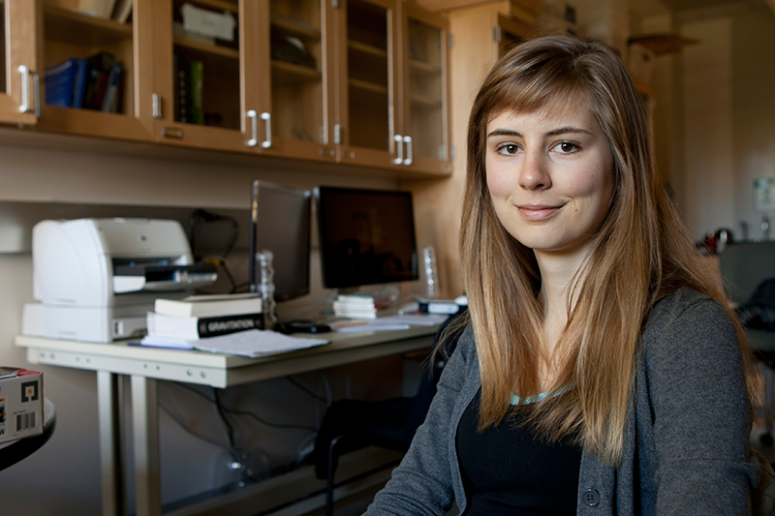Chasing the Big Bang

Hillary Child '13
From Kenyon News - June 25, 2013
Hillary Child '13 has won a National Science Foundation Graduate Research Fellowship, thanks in part to her significant research in computational cosmology.
The fellowship grant is a rare feat for an undergraduate and provides a $30,000-a-year stipend for three years as well as $12,000 a year to the graduate institution for the cost of education. Child's mentor and research collaborator, Tom Giblin Jr., assistant professor of physics, said Child's work represents "true progress toward a better understanding of fundamental physics."
Child of Coeur d'Alene, Idaho, is a physics and Russian major bound for graduate school at the University of Chicago.
The Department of Physics at Kenyon may not be large but it's very strong, she said. "There's a lot of really good research going on and it's very easy to get involved with the research, much more than I would have been able to do at some larger place," Child said. She has twice qualified to participate in the Summer Science Scholars program, dedicating her summers to concentrated research in collaboration with Giblin.
"What I've been doing the past few years in research is computational cosmology, computer simulations," she said. "I've enjoyed that very much. I initially got into that because I've been kind of interested in astrophysics. When I go to grad school, I want to look a little more into astrophysics."
Computational cosmology uses advanced numerical simulations to explore the structure, evolution and content of the universe, from the Big Bang to dark energy.
Child co-authored a paper in the prestigious Journal of Cosmology and Astroparticle Physics and has submitted another co-authored paper to Physical Review Letters. Her senior honors project was called "Numerical Simulations of Non-canonical Scalar Fields."
Of her interest in physics, Child said, "I've always liked science and I've always liked math. Physics seemed to be the most math-y of the sciences, and it was also related to the real world. I like the problem solving, I like spending hours on something that is really difficult. It's miserable when you're doing it, but, then, it's so wonderful once you get to the end. It's so satisfying to finish the problem."
"She works very hard," Giblin said, and he believes that Child is the first from Kenyon to win the National Science Foundation fellowship as an undergraduate. "In particle physics it's possible that the fundamental particles obey a different type of dynamics. This was the first set of numerical simulations that test whether or not those dynamics are a consistent model of fundamental particle physics," Giblin said. "It is groundbreaking."
The fellowship, he said, is "a really big deal." And, Child said, the fellowship "opens up a lot of doors." She considered her application a long shot. Most undergraduates, she said, "don't do so much research with their professors, and they don't have the same kind of recommendations."
The National Science Foundation awarded 2,000 fellowships this year. The fellowships have been awarded since 1952 to individuals selected early in their careers based on demonstrated potential for significant achievements in science and engineering. A number of fellows have gone on to become Nobel laureates.
Child has been planning on graduate school since she arrived at Kenyon. "That's a natural next step. I've really enjoyed the research I've done so far, and I've loved learning. I'd like to learn more physics and I'd like to do more research." She may pursue a career in industry or government research or in academia.
"It's just the beginning."